Exclusives
Desert Harvest Commits to Phasing Out Plastic Bottles for All Supplements
The company will transition to a system of compostable, plant-based bags and offer consumers Bluetooth-enabled smart bottles.

By: Mike Montemarano
Desert Harvest, a dietary supplement manufacturer specializing in concentrated aloe extracts, announced its plans to phase out single-use plastic bottles for all of its supplements by the end of 2022. To accomplish this, the company will package all of its supplements in plant-based compostable bags, beginning with its Super-Strength Aloe Vera capsules, a supplement which targets symptoms of chronic bladder pain and interstitial cystitis.
The company will offer consumers refillable, rechargeable, Bluetooth-enabled smart bottles, which can connect to an app that tracks pill usage, pushes refill reminders, and more. For these bottles, which have an estimated lifespan of five years, the company will run a recycling program to address their minimal impact.
“When discussing the smart bottle, many people brought up how useful this could be for people who might have issues remembering to take their supplements,” Heather Florio, CEO of Desert Harvest, said. “An app which can track usage creates a layer of accountability beyond convenience, which could be great for elder care … Even in clinical research studies, remembering to take supplements could be an issue. In many trials, when bottles are brought back in to verify compliance, what happens in between the beginning and the end of the study is based on the honor system. This can really help a clinician track supplementation remotely during research. There many other ways this technology can be used that we probably haven’t even thought of.”
When it comes to how much plastic this initiative will prevent from reaching landfills, “we’re talking about millions of bottles here,” Florio said. “And, the smart bottle is fully recyclable. All of the materials in the bottle are reusable, and we believe we can convince consumers to send those bottles back by keeping it simple and sending them a return label at the end of a smart bottle’s life span.”
Additionally, through an agreement with ImpacX, the company’s smart bottle supplier, every bottle purchased will support the cleanup of 1,000 pounds of plastic at various sites for every smart bottle purchased. The six-month exclusive agreement between Desert Harvest and ImpacX will introduce this patented smart bottle technology to the U.S. market, and hopefully afterward, other supplement companies will jump at the opportunity to connect to this program, Florio said.
“We’re looking at areas that might not have modernized ways to take care of their trash,” Florio said. “So, this is really a land and sea project. We’re partnering with a company called CleanHub, and can watch in real time on their platform the impact we have in terms of cleanup for every bottle sold. So we’ll see how many pounds or tons we’re taking out to offset plastic waste. This has been an awesome partnership.”
Impact
According to Desert Harvest, the plastic generated by $31 billion worth of supplements sold annually in the U.S. and 4.7 million retail prescriptions filled on a yearly basis is largely winding up in landfills.
The transition to sustainable packaging is one component of Desert Harvest’s commitment to reducing its environmental footprint. The company also uses Cradle to Cradle-certified USPS recycled packaging, its office building and its warehouse are powered by hydropower, its print facility is wind-powered, and it intends to replace its company vehicles with an all-electric fleet by 2025.
Florio said that while there are some challenges or concerns when it comes to phasing out all plastics as a supplement company, but that most companies shouldn’t consider it prohibitive.
“First, it definitely matters what equipment you have in your production, and whether it can still function after switching from a bottle to a compostable bag,” Florio said. “There’s also the question of how a product will sit on a store shelf, which wasn’t a major issue for us since we do a lot of direct-to-consumer sales and doctors often recommend our products to patients. Retail is certainly part of our ongoing conversation, and we work with a lot of pharmacies, so it is something we’ll have to look at and think about. But, for a lot of people, I think making the switch is largely just a fear of the unknown; it’s something that’s completely different from what anyone else is doing at the moment. We essentially modified a coffee bag into something that could be a supplement bag, and so far, we’re loving it.”
Moving onto the company’s liquid products will certainly be another challenge, Florio said. Current offerings for compostable packaging today allow for mostly-compostable liquid packaging, but no mass-producible bottles have reached 100% compostable status yet. But packaging companies have been heading in that direction for a while, Florio said.
Ultimately, with plans to phase bottles out of its supplement supply chain by year’s end, Desert Harvest hopes to set a bold example for the rest of the industry.
“You can actually compost our packaging in your back yard to benefit your home garden, I think that’s the greatest thing about it,” Florio said. “I certainly want to see other companies take advantage of this opportunity.”





















